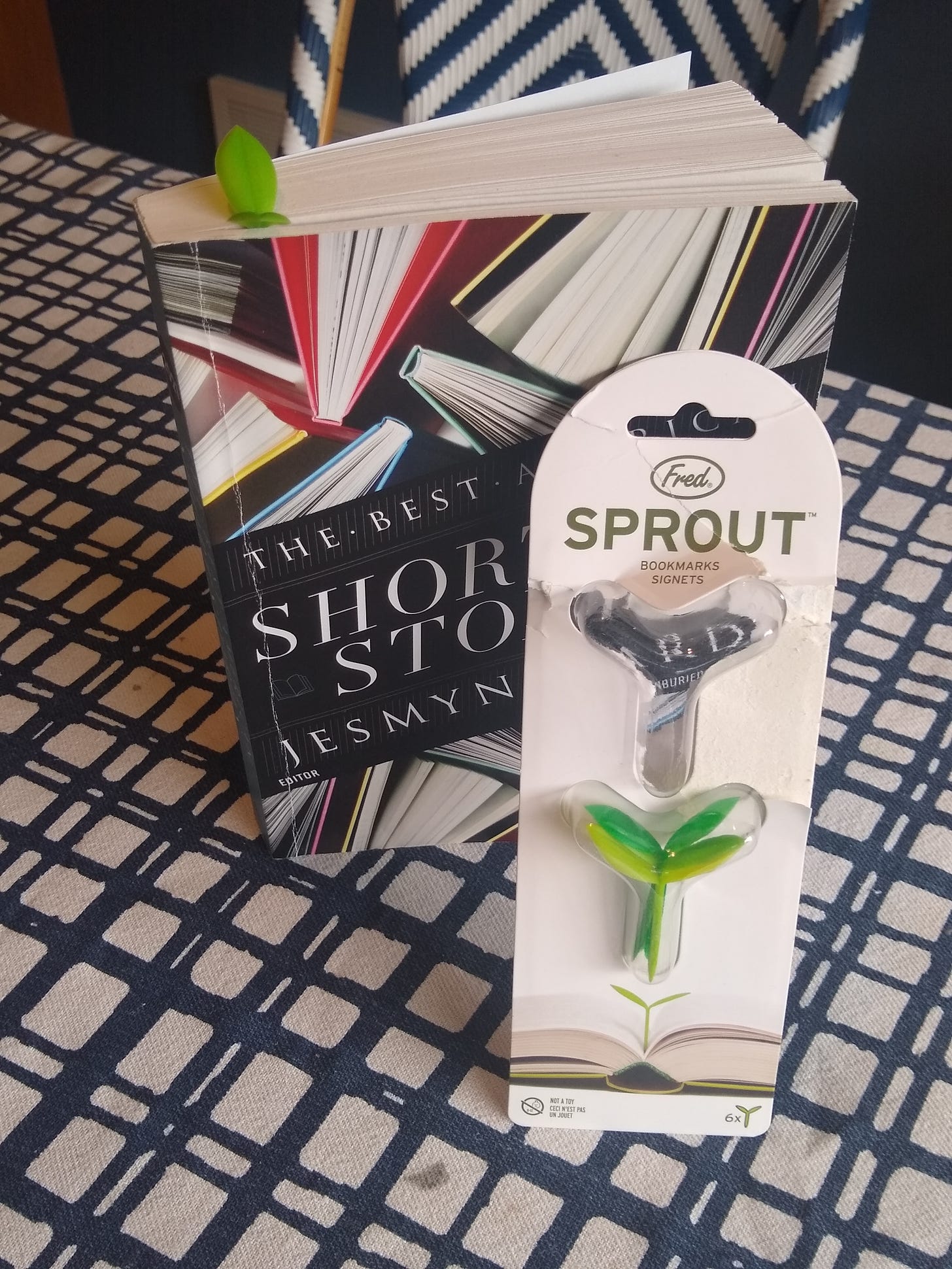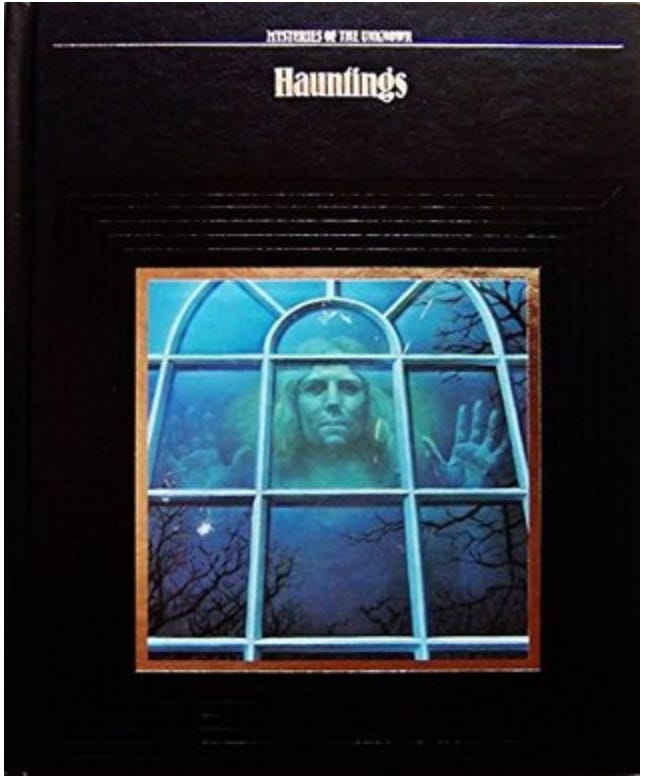Cures for Ruts, Blahs, and Blocks
Watch amazing Olympic feats, festoon your books with little sprouts, and read a new genre to lift yourself out of that rut.
February’s edition of The Tumbleweed is all about my best tips for getting over winter blahs, writer’s block, and dreaded cases of I-don’t-want-to-get-out-of-beds.
One of my earliest memories is of a coloring book featuring the raccoon mascots from the Lake Placid Winter Olympics in 1980, which my mom gave me when I was three. I have been an Olympics fanatic ever since then. I have actually never met anyone who loves the Olympics as much as I do. Though, thankfully, my family is almost as into it as I am, so they don’t think it’s weird when we go from not watching much TV for two years to watching ALL THE TV for two weeks.
Watching the Winter Olympics is my favorite cure for winter blahs. It’s hard to worry about how you haven’t seen the sun in awhile when you can watch Ayumu Hirano defy gravity and the rules for human spines in the halfpipe. Even with controversy and political conflicts that always tag along at the Olympics, performances like this clear the gloom.
I’ve noticed a difference in my response this year, though. A lot of the youngest competitors are similar in age to my own kids. I am too emotionally involved when these youngsters splat on the ski jump, ski out of bounds on the slalom, or fall on the ice. I used to carefully evade all knowledge of the results so that I could watch the events in the evening in suspense. But when it came down to Sean White almost missing out on making the halfpipe final—I felt like I was going to puke as I watched his final run live. (He made it.) I told my family that I need to find out the results before I watch the events now, because my sensibilities have become too delicate. They told me I was being ridiculous. How is it ridiculous? I’ve known Sean White longer than I’ve known my own son. I want him to do the best he can.
Because I’ve watched the Olympics so avidly, I didn’t need to know the backstory when I learned Lindsey Jacobellis finally won a gold medal in snowboard cross, at the age of 36, after trying an unnecessary trick when she was in the lead five Olympics ago at age 20, falling and coming in second. Her story inspires me as a writer because, yep, we screw up, we fail to make the most of opportunities sometimes, but if you keep trying, and keep training, there’s always a chance.
Another way Olympic athletes inspire me as a writer is when I follow the workouts they document on social media. I’ve been following Rai Benjamin since his epic 400 meter hurdle race against Karsten Warholm at the Summer Olympics, one of the most thrilling sports moments I’ve ever seen, which many call the greatest race in history. Both men busted records, and Benjamin came in second by inches. He’s been grinding ever since. On Instagram you can see him lifting insane piles of weights, doing backward lunges with chains around his neck, performing box jumps, always training for his next opportunity. It inspires me to know that as I sit at my writing desk, toiling for years to write a novel, somewhere King Ben is toiling too, preparing for his next Olympic chance four years from now. How hard can it be for me to push this pen across the page when King Ben is pushing some kind of weighted torture device across a field?
The Assorted Whimsy Portion of The Tumbleweed
My mom gave me these Sprout bookmarks for Christmas, and they somehow have brightened my days out of all proportion to what you’d expect a bookmark could achieve.
I always have trouble keeping track of paper bookmarks. They fall out while I’m reading and get buried in the covers of my bed. I usually mark my place in books by sticking a pencil where I left off, because I’m often making notes for a book review or some class I’m teaching. But now I only want to mark my books with sprouts. These sprout bookmarks stay in the book, even while you’re reading—so they’re right there when you are ready to mark the next place you’re stopping.
Plus, I’m a plant person, so it just cheers me up to see a little sprout emerging from my book, especially during winter months when I can’t garden.
The Book Recommending Portion of The Tumbleweed
Whenever I’m in a reading rut, the best thing to do is to pick up a book in a genre I don’t normally read. Genres I only dip into on occasion include graphic novels and poetry—and I always come back to my bread-and-butter of fiction and nonfiction refreshed after reading these genres. I recently read the classic Understanding Comics by Scott McCloud with my son, who was assigned it for a seventh-grade graphic novel unit.
The book was easy to read, but its concepts were more like college-level, so I recommend it for high schoolers and up. McCloud’s ways of thinking about and categorizing art blew my mind, and gave me ideas for parallels I can draw between comic writing and prose writing for a class I’m teaching this summer.
Next, I recently read Philomath, the absolutely gorgeous debut poetry collection by Devon Walker-Figueroa.
Because I don’t write, teach, or review poetry, it’s hard for me to articulate why I enjoyed it so much. Here’s my best shot: Walker-Figueroa vividly evoked her life growing up in rural Oregon through images that felt like little fireworks exploding in my brain.
The past two years have been long and Covid-laden, and we’re smack in the second winter of it (or the third, depending on what day you’re counting from). My best recommendation for how to keep your spirits up is to find the pop-cultural trash that is your favorite, and just indulge. Relish. Free yourself from judgment about its quality. I don’t mean to insult this material as I call it “trash”—I just mean books, movies, TV and music that rarely win awards, that exist for enjoyment. To me, trash is a compliment. My personal trash of choice is ghost trash.
I was a kid who checked the Time/Life Mysteries of the Unknown books out of the library so often, they probably spent more time in my bedroom than on the library’s shelves. My mom ended up giving me half of the 33-book collection for my birthday one year. During the pandemic, I’ve rekindled my childhood love of ghost trash through the podcast Spooked, which actually is not trash at all, but features people from all over the world telling about their encounters with the paranormal. Then I started watching Psychic Kids, and okay, that is straight-up trash, but it nurtured me.
Finally, I discovered the podcast that seems like it was created specifically for me: Are You There, Ghost? It’s Me, Chiwan. Chiwan Choi is a poet and literary gadabout who has been seeing ghosts since he was four years old. He realized that many other poets and writers have had similar experiences, and he put together this show on which he interviews people about their ghost stories, and then has them read the poetry or prose that these experiences inspired. The podcast is fantastic. I first found out about it because he interviewed Denver poet Andre Houillete and Denver writer Hilary Leftwich, both of whom I know from the Mile High MFA. Once I heard those two episodes, I was hooked.
Chiwan Choi has great taste in the writers he interviews. I’ve learned about a lot of poets whose work I now want to read. And Choi himself is just absolutely winsome—a curious interviewer who brings out real depth in the conversations and who has an infectious laugh. Listen to Chiwan Choi laugh with his poetry buddies about ghosts for a few minutes, and I dare you to maintain a gloomy mood. Start with the Andre Hoilette episode, or try the fascinating episode about poet Thomas Ahneesan’s encounters with Sasquatch in Alaska, or this great haunted house story with Samantha Dunn.
The Q&A Portion of The Tumbleweed
Q: “What does it mean when a literary journal passes on your piece but says that have another contest coming up if I’m interested in submitting to it? Do I send the same piece? They also asked if I had other work, they would love to read more. Do I send them more? I get this reply a lot too: ‘We didn’t accept it for this issue but we’d love to see more work from you in the future.’”
A: Okay, friends, when a literary journal or editor or agent tells you something like this, this is what I call a good rejection. (You can check to see whether your rejection is an especially good one by comparing it to examples of others people submitting to the same journal have received on Rejection Wiki.) It is always an encouraging sign when a literary magazine or website invites you to submit again. They really mean it—they don't just say that to everyone, because they are inundated with submissions enough as it is. The only exception I can think to this is if they invited you to submit to a contest that costs money—then their enthusiasm for your work might not be as genuine as their enthusiasm for your money!
When an editor tells you that they want you to submit again, they mean to send them something new. The only exception is sometimes an editor will explicitly say, if you change X and Y, we will consider this story again. But that is pretty rare. If they haven't taken a piece for one issue, they are probably not going to take it for the next issue (or else they would have kept it). So that is tricky if you don't have a bunch of pieces ready to submit, but you can always keep track of the editors who encouraged you in your submission spreadsheet, and when you do have something new, in your cover letter, remind them that they encouraged you to submit again.
Getting these kinds of messages means that you're really close to finding a home or the piece. Every time I've gotten a bunch of encouraging, non-form rejections, I've eventually found a place that wanted to publish that story.
Kelli Russell Algodon is an editor who wrote about how when she encourages women writers to submit again, they rarely do, but when she encourages men to submit again, they often do. So be sure to follow up with those places!
Have a question? Leave a comment or send me an email.
The Self-Promotional Portion of The Tumbleweed
I will be reading from Mixed Company on Wednesday, March 2 at the Tattered Cover Colfax at 7 p.m., and I would be delighted to see you there!
I had a great time talking to Nathan Heffel of Colorado Matters on Colorado Public Radio about Mixed Company.
I’m going to be teaching five craft classes at the fabulous Lighthouse Writers Workshop’s annual Lit Fest in June. After two years of only Zoom, classes will be a mix of both online and in-person options in Denver. Sign ups will start in April.
Notre Dame Magazine featured Mixed Company in its winter issue.
Regis University Magazine mentioned Mixed Company along with new books by my stellar colleagues in the Mile High MFA.










